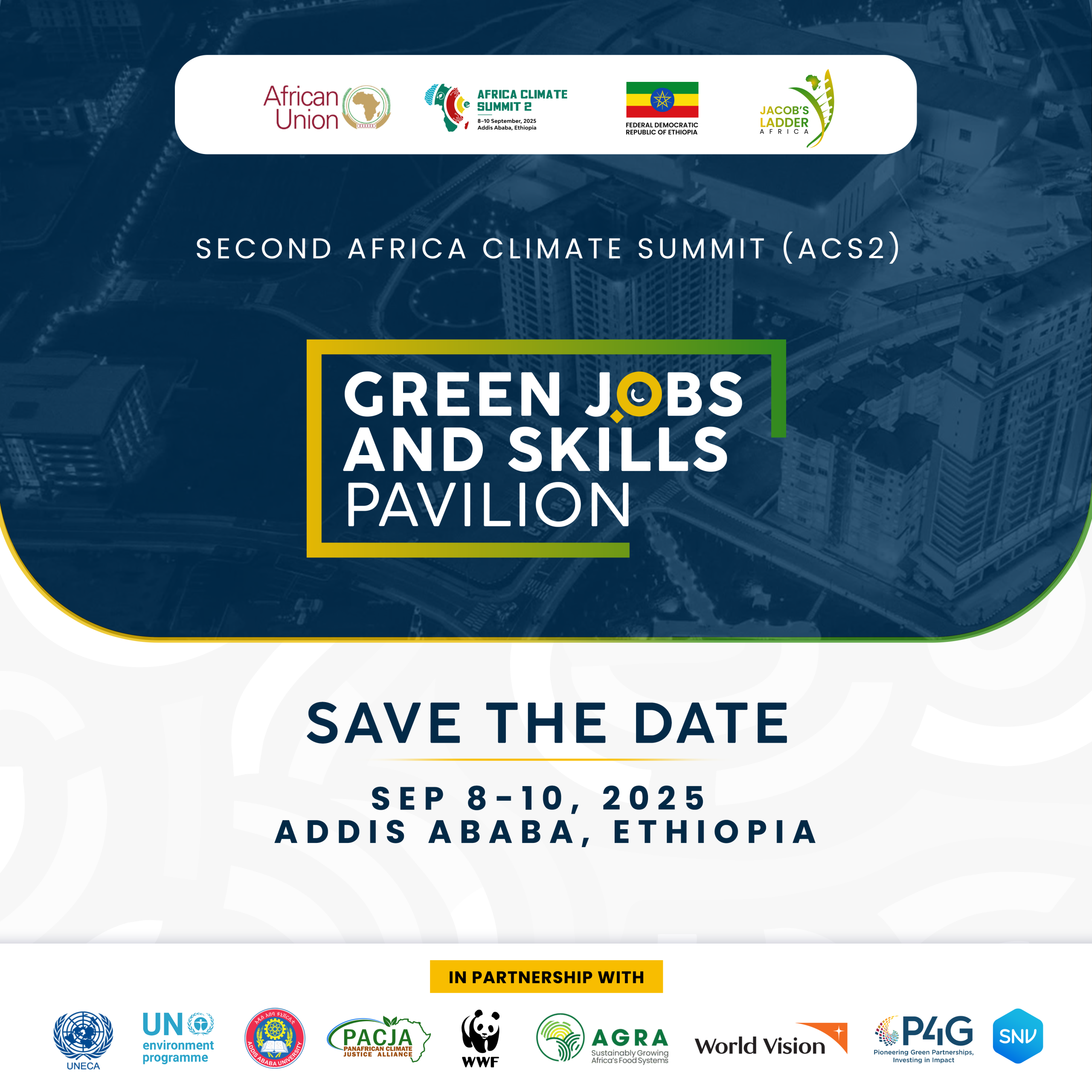Nairobi/Addis Ababa- 27 August 2025– The second Africa Climate Summit (ACS2) is set to take place from September 8 to 10, 2025, at the Addis International Convention Centre (AICC) in Addis Ababa, Ethiopia.
Jacob’s Ladder Africa (JLA) is playing a leading role in advancing the green jobs and skills agenda at the summit, with a focus on creating tangible employment opportunities linked to climate action.
Jacob’s Ladder Africa will spearhead two major engagements during ACS2. On September 10, it will host a high-level session at the Africa Pavilion in partnership with the African Union Commission’s Department of Education, Science, Technology and Innovation (AUC-ESTI). The session aims to highlight strategies for developing Africa’s green workforce and will include collaboration with the Ethiopian Ministry of Planning and Development, the United Nations Economic Commission for Africa (UNECA), UN Environment Programme (UNEP), Addis Ababa University (AAU), PACJA, World Wide Fund for Nature (WWF), Alliance for a Green Revolution in Africa (AGRA), World Vision, P4G and SNV.
The African Union Commission, through its Department of Education, Science, Technology and Innovation (ESTI), reaffirms that the green skills and jobs agenda is central to the recently adopted Continental Strategy for Technical and Vocational Education and Training (CTVET) 2025–2034. The Strategy prioritizes equipping Africa’s youth with future-ready skills to drive
sustainable industrialization, climate resilience, and inclusive growth. As part of this commitment, the AUC will also be convening Africa Skills Week 2025 in October, which will foreground green skills development as a key driver of Africa’s economic transformation under the Decade of Education and Skills Development (2025–2034).
This upcoming continental platform will build on the momentum of the Africa Climate Summit, providing space for governments, private sector, civil society, and youth to co-design solutions for scaling green workforce opportunities.
JLA will also host the Green Jobs & Skills Pavilion, a dedicated space running concurrently with the summit’s main events. The Pavilion is designed as an African-led, solutions-driven platform to address the urgency of solving climate vulnerability and unemployment among youth, women, and marginalized communities, through green job creation. It will facilitate dialogue and innovation among diverse leaders, women, indigenous groups, private sector actors, civil society, and policymakers.
Sellah Bogonko, Co-Founder and CEO of JLA, emphasized the importance of concrete action: “Africa’s youth, women, and marginalized communities need real jobs and sustainable livelihoods, not empty promises. When supported, they become the innovators and changemakers advancing Africa’s green transformation.” She described the Pavilion as a call to recognize green jobs and skills as critical links between climate ambitions and economic justice.
The Pavilion will focus on sectors with high potential for green job creation, such as renewable energy, sustainable agriculture, and e-mobility. Projections underline these sectors’ promise where renewable energy could create up to 4.5 million jobs by 2030 through decentralized solar and clean cooking solutions.; sustainable agriculture could unlock 700,000 jobs, including 377,000 from climate-smart agriculture technologies; and e-mobility is expected to develop into a $2.85 billion market by 2030, generating employment across manufacturing, logistics, servicing, and software development.
JLA’s leadership at ACS2 builds on the foundation laid during ACS@ONE, a series of civil society-led post-Summit meetings in late 2024 that reviewed progress since the inaugural Africa Climate Summit in Nairobi and explored practical African-led climate solutions.
By focusing on actionable outcomes, JLA aligns its work with Agenda 2063, demonstrating how climate action can drive economic progress for Africa’s marginalized populations, shifting the narrative from aid dependency towards investment in local innovation.
ACS2 is expected to gather more than 45 heads of state and government, alongside ministers, development partners, youth leaders, civil society, and private sector representatives. Co- convened by the Ethiopian government and the African Union Commission, the summit will emphasize Africa-led climate solutions and mobilizing climate finance under the theme “Accelerating Global Climate Solutions: Financing for Africa’s Resilient and Green Development.
